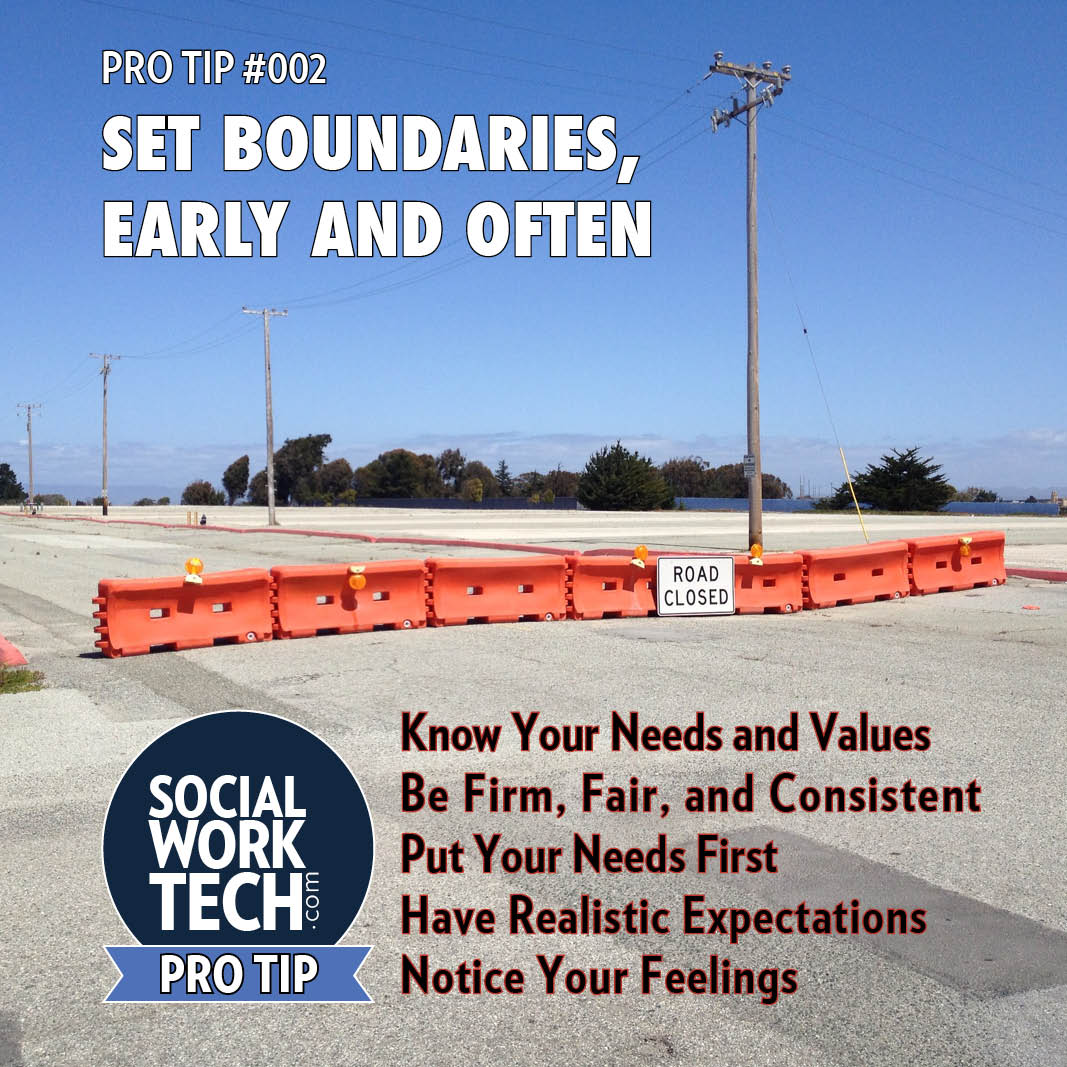Setting boundaries is something we social workers often teach their clients – it’s good to practice what we preach! Setting boundaries early in a relationship is very important, as you establish respect for yourself, acknowledge your limits, and pay homage to your values.
Setting boundaries early in a relationship is great to let incredibly needy people (not just clients) know that there are things that you will and will not tolerate. It also saves you from being taken advantage of.
Set boundaries, early and often, for better professional performance, relationships, and self-worth.
Know Thyself: Your Needs and your Values
Take Ownership of Your Needs
I-Statements are very helpful in taking ownership of your needs and values.A simple exercise is stating to yourself, “I deserve…”, “I want…”, “I need…”, “I want feel…”.
For example:
- I really need space right now.
- I don’t feel comfortable with ___________.
- I feel __________ when I am subjected to ____________.
My best advice is to avoid using “you”. Imagine someone saying to you:
- You are violating my space.
- You make me feel uncomfortable when you ____________.
- You ________ me when you ___________.
Be Aware of Your Values
What are your most important values? Some may include: family, academics, friendship, loyalty, respect, dignity, honesty, the golden rule, faith or religion, etc.
Be aware that these values will conflict, causing grief, agita, and the possibility of ethical dilemmas.
The Core of Boundary Setting
At the same time, boundaries can also be set using I-statements such as “I do not deserve…”, “I do not want…”, “I do not need…”, “I do not want to feel…”
Be Firm, Fair, and Consistent
Being firm, fair, and consistent is the best way to go about setting boundaries with your clients, colleagues, and other associates.
Firm
Being firm simply means that you hold strong to your needs, beliefs, or values. It also means communicating your need in a manner that can be understood without question.
Fair
There can be several interpretations to being fair. First, be fair to yourself and your own needs. Be fair to others without compromising on what is best for you. Accommodate everyone in the same manner, but if possible, try to meet people where they are at.
Consistent
Nip a boundary violation in the bud as soon as it happens; be equitable with the boundary-setting with the different personalities you encounter.
Put Your Needs First
A lot of people confuse putting your own needs first with being selfish or greedy. Imagine what your life would be like if things you needed were taken away from you, violated, or constantly trashed. Putting your needs first means having better control.
Have Realistic Expectations
Clarification
Your expectations (for yourself and others) may need time to be defined and clarified. The cognitive dance that is done in your mind between what you want, what you need, and the other emotions present may need time to resolve.
Compromise
There are times when your needs (e.g. Saturdays to yourself for family time) are not feasible; graduate school is hard and often requires sacrifice of your time, money, sleep, sanity, blood, and tears. Making tough choices is a necessary task, especially for a long-term gain.
Realistic
Your needs and values are real, so putting yourself first, when setting boundaries should feel right.
Notice Your Feelings
Notice your feelings when you set boundaries. If you feel angry, sad, or annoyed, ask yourself why.
At First
At first, boundary-setting may feel difficult, especially if we have never practiced. It feels weird [clinical term] and as if we’re being mean to the other person. Setting a boundary can be tough: sometimes it feels like we’re stepping on other peoples’ toes when they’re they ones who are making us feel bad. Setting a boundary at first can be incredibly awkward and equally uncomfortable. Just remember to breathe, state your peace, and have no expectations.
Over Time
This is resolved by time, as practicing boundaries will help you to better understand your values. The benefit of practice is that over time, you might feel better self-esteem and self-worth over putting your needs first.The first few times a boundary is set with others, sometimes the boundary-setting person may feel guilt for being “rude” or “mean” to the other person. While the person who violated your boundary may or may not apologize to you, notice how you feel after you have verbalized what you want.
Application to Social Media
On Facebook, Twitter, and Tumblr, I find myself practicing boundary-setting all the time! It’s amazing! If you want to practice boundary-setting, social media is a great place to do it.
Annoying Content
On Facebook, you have lots of options, spanning from hiding a single post, “hide all posts from this user”, to “Unfriend”. I often hide posts from Facebook friends that have political views I find abhorrent (e.g. infringing on my values) in spite of my affinity towards them.
Venomous Content
There is such a thing as venomous content: those attacking body image, promoting hate or racism, and gratuitous gore. I have encountered this on various social media platforms and I have walked away in the way that you do on social media – [unfollow] – also keeping my dignity intact.
Triggering Content
When I am at home, I no longer want to social work. My guard is down and all I want to do is look at cats doing silly things, read my tech articles, procrastinate on this blog, and laugh at all the memes.
My need for relaxation and decompression from work makes me need to block users and pages that show up on my streams with things that trigger a deep level of discomfort in me: gore, victims of domestic violence that have been beaten to a pulp, glorification for cutting, etc.
Resolving Conflict Due to Ongoing Boundary Violations
The Garden
This is an intervention and metaphor that I use to practice for identifying needs and having good boundaries.
Picture life as a garden:
- How would you symbolize your good qualities in this garden? (e.g. personality traits, talents, etc. are the fruits, flowers, and trees)
- What do you basic needs does the soil in your garden have? (i.e. basic needs)
- What does your garden need to thrive? (e.g. self-care behaviors that promote wellness in mind, body, and spirit)
What will you do when something disrupts your garden:
- What animals might come in? How might they disrupt your garden? (e.g. a bunny [colleague] that eats your carrots [wastes your time] without asking).
- What will you do to keep pests out of your garden (using non-violent means)?
- Do you have any general rules for those you let into your garden? What are they.
Thanks for reading! How do you develop good boundaries?









1 Comment